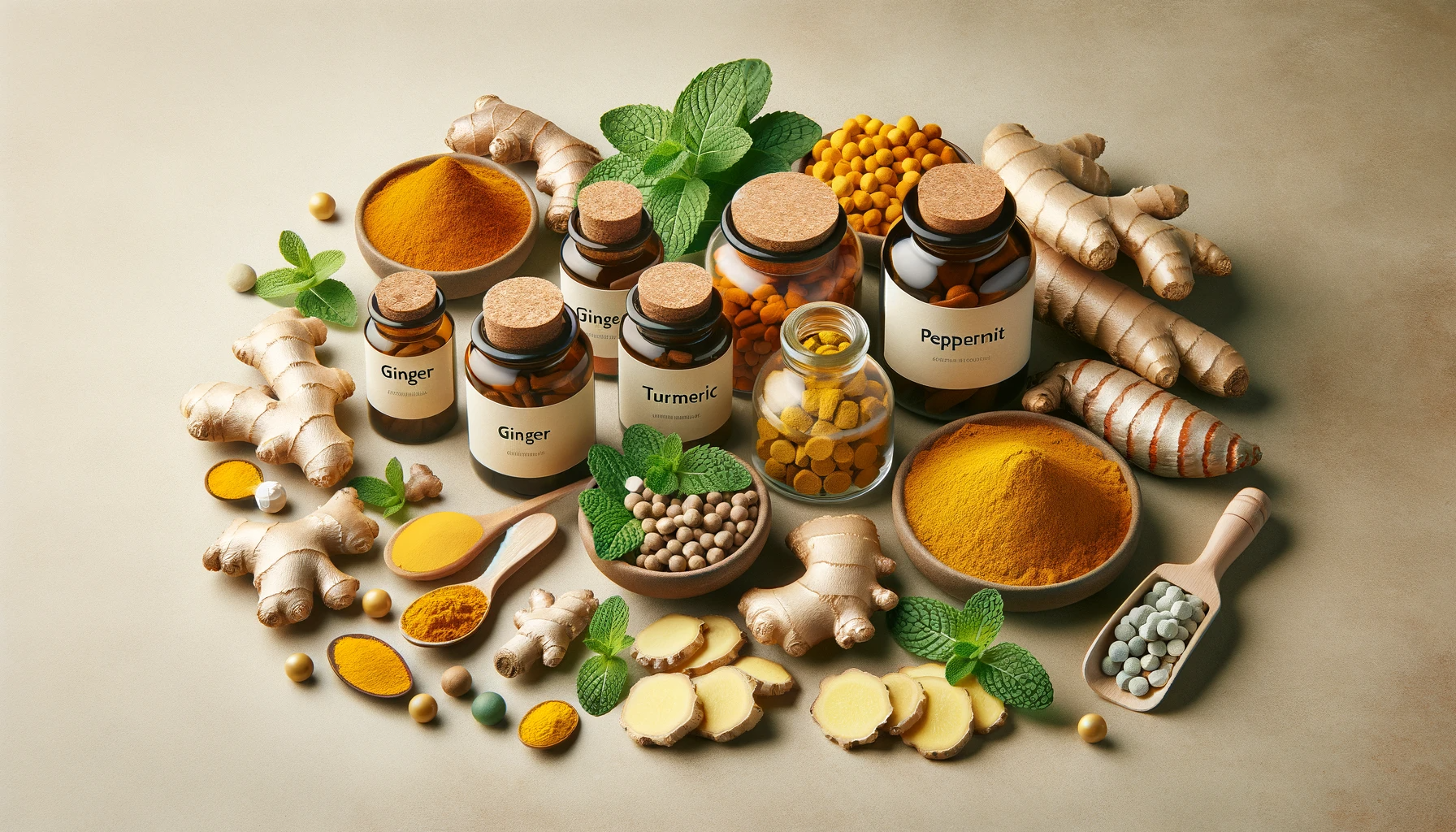Gut Health Supplements: A Comprehensive Guide to Enhancing Your Digestive Wellness
Posted by Kylie Shaw on 20th Nov 2023
Introduction
Overview of the Importance of Gut Health
Gut health is pivotal to our well-being. It is crucial for digestion, immune function, and mental health. This article delves into gut health supplements, offering insights into how they can enhance your digestive health and overall wellness.

Brief Introduction to Gut Health Supplements
Gut health supplements, including probiotics, prebiotics, digestive enzymes, and fibre, are designed to support the intricate ecosystem of the gastrointestinal tract. Understanding and utilising these supplements effectively can significantly improve our gut health.
Importance of Gut Health
Role of the Gut in Overall Health:
The gut is more than just a digestive organ; it's a cornerstone of health. It impacts digestion and nutrient absorption and plays a vital role in immune system regulation and mental health through the gut-brain axis.
Impact on Digestion, Immune System, and Mental Well-Being: A healthy gut contributes to efficient digestion, robust immunity, and mental clarity. Disruptions in the gut microbiome can lead to various health issues, including allergies, lactose intolerance, and mood disorders.
Types of Gut Health Supplements: Probiotics and Their Benefits Probiotics, including live bacteria and yeasts, are known for their positive effects on the gut microbiome. They improve gut flora, aid digestion, and even impact mental health.
Prebiotics and Their Role: Prebiotics, non-digestible food components like fibre found in bananas, onions, garlic, and asparagus, feed the beneficial bacteria in the gut, promoting a healthy gut environment.
Digestive Enzymes and Their Uses: Digestive enzymes assist in breaking down complex food components, aiding in nutrient absorption and reducing symptoms of pancreatic insufficiency.
Importance of Fibre Supplements: Fibre, found in foods like psyllium husk, is essential for maintaining gut health. It supports bowel regularity, nutrient absorption, and the growth of beneficial gut bacteria.
Natural Supplements for Gut Health
Benefits of Ginger, Peppermint, and Turmeric Natural supplements like ginger, peppermint, and turmeric offer many benefits for gut health. They reduce inflammation, ease gastrointestinal discomfort, and promote healthy digestion.

Incorporating Natural Supplements into the Diet
Incorporating these natural supplements into your diet, along with fermented foods like yoghurt, kefir, and sauerkraut, can significantly enhance gut health.
Lifestyle and Gut Health
Effect of Diet on Gut Health: A diet high in processed foods, sugar, and unhealthy fats can negatively impact gut flora. Conversely, a balanced diet of fibre and natural foods supports a healthy gut.
Importance of Exercise and Hydration: Regular exercise and adequate hydration are vital for maintaining a healthy gut. Exercise promotes gut motility, while hydration ensures efficient nutrient absorption and digestion.
Stress Management for a Healthy Gut: Stress management is crucial for gut health. Chronic stress can disrupt the gut microbiome, leading to various health issues.

Safety and Consultation
When to Consult a Healthcare Professional:
It's vital to consult healthcare professionals when considering gut health supplements, especially if you have underlying health conditions or are taking other medications.
Safe Practices in Using Gut Health Supplements:
Always adhere to recommended dosages and be mindful of potential drug interactions and adverse effects, particularly for specific groups like pregnant women.
Conclusion
Recap of Key Points:
Gut health is integral to overall wellness. Utilising gut health supplements, making dietary changes, and adopting a healthy lifestyle can profoundly impact your gut health.
Encouragement for a Holistic Approach to Maintaining Gut Health:
Embrace a holistic approach to gut health, combining supplements with a balanced diet, regular exercise, adequate hydration, and stress management for optimal well-being.
FAQ Section
- What are the top gut health supplements?
Probiotics, prebiotics, digestive enzymes, and fibre are among the top supplements for gut health. They work synergistically to improve gut flora, digestion, and overall health. - How do probiotics improve gut health?
Probiotics introduce beneficial live bacteria into the gut, enhancing the gut microbiome, aiding digestion, and potentially impacting mental health. - Can lifestyle changes enhance the effectiveness of gut health supplements?
Absolutely. A balanced diet, regular exercise, adequate hydration, and stress management significantly enhance the effectiveness of gut health supplements. - Are natural supplements like ginger effective for gut health?
Natural supplements like ginger, peppermint, and turmeric promote gut health by reducing inflammation and improving digestion. - What are the risks associated with gut health supplements?
While generally safe, some supplements can interact with medications or cause adverse effects in specific individuals. Consultation with healthcare professionals is recommended. - How does a balanced diet impact gut health?
A balanced diet including fibre, natural, and fermented diet supports a healthy gut microbiome and overall digestive health. - When should one consult a healthcare professional regarding gut supplements?
Consult a healthcare professional before starting any gut health supplements, especially if you have existing health conditions or are on medication.
Disclaimer:
Please note that the information contained in this article is not intended to replace professional medical advice. It is always advisable to consult with a qualified healthcare professional or dermatologist before making any significant changes to your skincare routine or adopting new skincare practices, especially if you have any underlying skin conditions or sensitivities.
References:
Gut-Brain Axis and Mental Health
- Cryan, J. F., & Dinan, T. G. (2012)
- Type of Study: Review
- Sample Size: Not applicable
- Main Findings: Explores the impact of gut microbiota on brain and behaviour, highlighting the gut-brain axis as a significant factor in mental health conditions.
- URL: PubMed
- Foster, J. A., & Neufeld, K. M. (2009)
- Type of Study: Review
- Sample Size: Not applicable
- Main Findings: Discusses the effects of gut microbiota on the brain with implications for psychiatry, suggesting a link between gut health and mental well-being.
- URL: PubMed
- Rhee, S. H., Park, S. H., & Lee, J. H. (2016)
- Type of Study: Review
- Sample Size: Not applicable
- Main Findings: Reviews the evolving field of gut microbiota's influence on brain function and its relevance to psychiatric disorders.
- URL: PubMed
- Wallace, C. J., & Mayer, E. A. (2022)
- Type of Study: Review
- Sample Size: Not applicable
- Main Findings: Provides an overview of the gut-brain axis, emphasising its role in both gastrointestinal and mental health conditions.
- URL: PubMed
Dietary Influences on Gut Microbiome
- Gibson, G. R., Hutkins, R. W., & Thompson, C. A. (2017)
- Type of Study: Expert Consensus
- Sample Size: Not applicable
- Main Findings: Discusses the role of prebiotics in the human gut microbiota and health, highlighting their importance in promoting beneficial bacteria.
- URL: PubMed
- Macfarlane, S., & Gibson, G. R. (1998)
- Type of Study: Research
- Sample Size: Not specified
- Main Findings: Investigates the effect of retention time on the ecology and metabolism of bacteria in the human colon, contributing to the understanding of prebiotics' role in gut health.
- URL: PubMed

